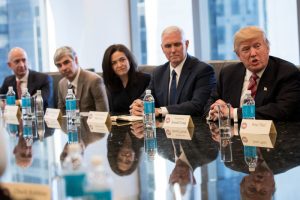Getty Images
By Katie McDonough / 12.15.2017
Congressional Republicans insist that their plan to slash the corporate tax rate from 35 to 21 percent will lead to higher wages, job creation, and overall economic growth. The executives running those corporations say they will hoard it. I wonder who’s telling the truth?
Last month, White House economic adviser Gary Cohn pitched the still-developing tax plan to a room full of CEOs at a conference organized by the Wall Street Journal. The paper’s associate editor John Bussey then turned to the audience and asked people to raise their hands if they planned to increase capital investments.
“Why aren’t there other hands up,” Cohn asked after seeing just a few hands go up. Then he laughed because he honestly does not give a shit about your life.
VIDEO: CEOs asked if they plan to increase their company’s capital investments if the GOP’s tax bill passes.
A few hands go up.
“Why aren’t the other hands up?” Gary Cohn asks.#WSJCEOCouncil pic.twitter.com/TD2oAlN27S— Natalie Andrews (@nataliewsj) November 14, 2017
The latest entry in this running series of wealthy executives being honest in a way that our elected officials are not comes to us by way of the Associated Press:
The companies seem likely to direct their money mainly to shareholders through dividends and stock buybacks, just as large U.S. corporations have already been doing with the ample cash they have in hand.
At an industry conference last week, Amy Hood, Microsoft’s chief financial officer, acknowledged that the tax changes wouldn’t drive business decisions on whether to make an acquisition or build a data center.
Don’t expect that “I’m going to spend a lot more capital” Hood said when asked what Microsoft would do with its windfall, according to a company transcript. […]
In a conference call with analysts last week, Ron Nersesian, CEO of Keysight Technologies in Santa Rosa, California, which makes equipment for electronic measurements, acknowledged that his company would use its windfall to reduce debt “or give back cash to our investors in the form of share buybacks or in dividends.”
This has been the pattern. Republicans like Paul Ryan claim that a windfall for corporations will benefit workers, and those same CEOs say that they will instead enrich themselves and their shareholders.
Nobody other than the rich benefits when the rich are allowed to accumulate more wealth because they hoard that wealth. Maybe they put it in a pool and swim in it or maybe they use it to purchase a copy of the Declaration of Independence through a private sale with Nicolas Cage, but they do not spend it in a way that circulates through the economy so that others might also get something out of it.
In an interview with n+1 co-editor Dayna Tortorici, Stephanie Kelton, a professor of economics at Stony Brook University and a former chief economist for the U.S. Senate Budget Committee, explained why this is (emphasis mine):
The marginal propensity to consume is the likelihood that if you get an extra margin, that extra dollar, you will spend it or spend part of it into the economy. A very poor person has an MPC of 99 percent or more: give them an extra dollar, or an extra $100, and they will spend virtually all of it, just because they’re surviving on so little. But if you give a tax break to someone like Oprah Winfrey or Bill Gates, and they get an additional dollar or $100 or $1,000, their MPC is something like 0.01 percent. They’re only going to spend a penny out of any additional $100 they get, because they already have enough to buy whatever it is they want to buy.
You see, trickle down is for charlatans and the rich do not need more money. The non-rich need more money, but they won’t get any under this tax plan. CEOs are oddly willing to say that out loud whereas Paul Ryan and Mitch McConnell choose to lie to your face while also coming for your Medicaid.
Originally published by Splinter News under a Creative Commons license from Gawker Media.


